Search the Special Collections and Archives Portal
Search Results
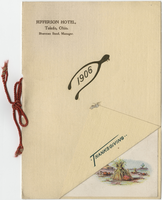
Thanksgiving 1906, menu, November 29, 1906, Jefferson Hotel
Date
1906-11-29
Archival Collection
Description
Note: Red cord; lower right corner of front page is turned up and fastened with a tiny white bow; includes music program Menu insert: Music Programs Restaurant: Jefferson Hotel (Toledo, Ohio) Location: Toledo, Ohio, United States
Text
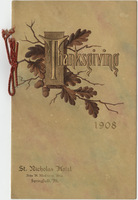
Thanksgiving dinner menu, November 26, 1908, St. Nicholas Hotel
Date
1908-11-26
Archival Collection
Description
Note: Red cord; illustrated with oak branches and leaves, acorns; ivory, rose and light blue marbled paper; page 4 folds over from left side of page 5 Restaurant: St. Nicholas Hotel (Springfield, Ill.) Location: Springfield, Illinois, United States
Text
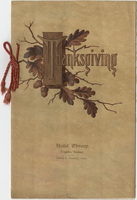
Thanksgiving dinner 1908, menu, Hotel Throop
Date
1908-11-26
Archival Collection
Description
Note: Red cord and tassel; illustrated with oak branches and leaves, acorns; ivory, rose and light blue marbled paper; page 5 folds over from left side of page 6. Verse from "At the Opera House" on page 3 Restaurant: Hotel Throop Location: Topeka, Kansas, United States
Text
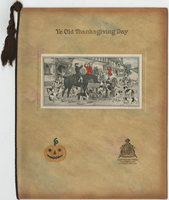
Thanksgiving dinner 1908, menu, Chittenden Hotel
Date
1908-11-26
Archival Collection
Description
Note: Ye Old Thanksgiving Day hunting scene on cover; Jack-o-lantern on cover; ivory, rose and light blue marbled paper. Includes music program Menu insert: Music Programs Restaurant: Chittenden Hotel Location: Columbus, Ohio, United States
Text
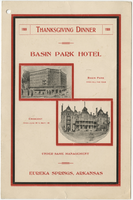
Thanksgiving dinner menu, 1908, Basin Park Hotel
Date
1905-03-22
Archival Collection
Description
Note: Front cover of menu has photographs of Basin Park and Crescent hotels. Inside menu's front cover, "Complimentary to Crescent College and its guests." Menu insert: Quotations Restaurant: Basin Park Hotel (Eureka Springs, Ark.) Location: Eureka Springs, Arkansas, United States
Text
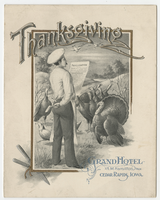
Thanksgiving, menu, Grand Hotel
Date
1870 to 1933
Archival Collection
Description
Note: Cover features an illustration of a man wearing a chef's hat and apron reading a Thanksgiving proclamation to a group of turkeys, while holding an axe behind his back Restaurant: Grand Hotel (Cedar Rapids, Iowa) Location: Cedar Rapids, Iowa, United States
Text
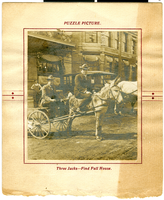
Menu for the Blodgett House, Sunday, June 29, 1902
Date
1902-06-29
Archival Collection
Description
Note: Photograph glued to front of menu. Menu opens upwards. Bottom of menu has torn effect Menu insert: Humorous features Restaurant: Blodgett House Location: Marshfield, Wisconsin, United States
Text
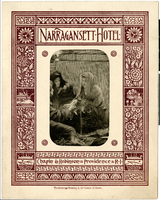
Menu for the Narragansett Hotel, Thursday, November 30, 1882
Date
1882-11-30
Archival Collection
Description
Note: Emblem for Chapin and Robinson, the hotel's proprietors, on the back of the menu Restaurant: Narragansett Hotel Location: Providence, Rhode Island, United States
Text
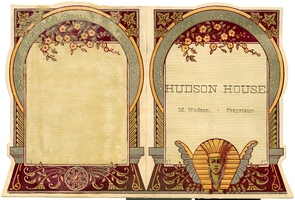
Hudson House, dinner menu, Sunday, March 16, 1884
Date
1884-03-16
Archival Collection
Description
Note: Menu is die-cut Restaurant: Hudson House Location: Lansing, Michigan, United States
Text
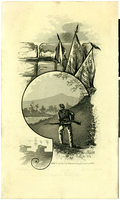
Beckel House, dinner menu, Sunday, March 30, 1884
Date
1884-03-30
Archival Collection
Description
Restaurant: Beckel House Location: Dayton, Ohio, United States
Text
Pagination
Refine my results
Content Type
Creator or Contributor
Subject
Archival Collection
Digital Project
Resource Type
Year
Material Type
Place
Language
Records Classification
